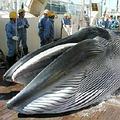 擴大後的國際捕鯨委員會年會,16日即將在東加勒比海的聖啟斯召開,而對於重新開放商業捕鯨的論戰,將可能在會中出現轉折。力求重新開放商業捕鯨的日本、挪威和冰島,在2005年的年會上以些微差距落敗,從那時開始,贊成反對開放商業捕鯨的兩派陣營就積極進行遊說以尋求支持。
擴大後的國際捕鯨委員會年會,16日即將在東加勒比海的聖啟斯召開,而對於重新開放商業捕鯨的論戰,將可能在會中出現轉折。力求重新開放商業捕鯨的日本、挪威和冰島,在2005年的年會上以些微差距落敗,從那時開始,贊成反對開放商業捕鯨的兩派陣營就積極進行遊說以尋求支持。
贊成商業捕鯨的日本一直不斷以外交援助以換取貧窮小國的支持,說服他們協助日本推翻1986年的商業捕鯨中止條款。在數個世紀的捕鯨造成多種鯨魚瀕臨絕種後,捕鯨活動的中止條款總算開始生效。
澳洲、紐西蘭、巴西、美國以及英國等支持保育的國家已試圖說服更多國家支持中止條款。澳洲環境部長坎培爾花費了數個月的時間,遊說該委員會中的太平洋群島成員國,但結果尚未明朗。
日本計算目前在委員會的70個成員國中,有36個支持者,不過還不能定論贊成商業捕鯨的國家一定是多數。日本是馬紹爾群島的第3大援助國,同時也努力遊說該國加入其陣營。保育陣營則希望這些小國家不會受到金錢外交的影響而動搖。
數天前加入委員會的以色列,成了支持保育陣營的生力軍。以色列沒有捕鯨業,雖然該國新政府尚未針對此議題制定政策,不過以色列加入委員會乃是回應美國關於協助捍衛商業捕鯨中止條款的直接請求。
日本已展現在這次會議中所擁有的優勢,首先投票排除國際捕鯨委員會保育委員會,該組織在2003 年組成,研究各項保育鯨魚的策略。
不過,今年保育國家也有一項支持保育立場的法律意見。一個由聚集在巴黎的獨立法律專家所組成的國際評估小組6月1日公布一項報告,發現根據國際法規日本科學捕鯨是「不合法的」,同時與主要的國際慣例互相牴觸。
這項發現挖日本牆角,削弱讓日本以科學研究為名、而自稱有合法權利進行商業獵殺鯨魚的立場。評估小組的「非法捕鯨巴黎報告」中聲明:有明顯證據指出由某些國際捕鯨委員會成員國所進行的「科學捕鯨」違反了「商業捕鯨中止條款」,而且這樣的捕鯨是「不合法的」。
 The battle over a resumption of commercial whaling is reaching a crisis point at this year's meeting of an expanded International Whaling Commission opening here Friday. Attempts to revive commercial whaling by Japan, Norway and Iceland were narrowly defeated at the 2005 annual meeting, and since then both sides have engaged in intense lobbying to build support.
The battle over a resumption of commercial whaling is reaching a crisis point at this year's meeting of an expanded International Whaling Commission opening here Friday. Attempts to revive commercial whaling by Japan, Norway and Iceland were narrowly defeated at the 2005 annual meeting, and since then both sides have engaged in intense lobbying to build support.
Pro-whaling Japan has been wooing small, impoverished nations with foreign aid to persuade them to help overturn the 1986 moratorium on commercial whaling. The moratorium took effect after centuries of whaling drove several whale species to the brink of extinction.
Pro-conservation nations such as Australia, New Zealand, Brazil, the United States and the United Kingdom have been attempting to persuade more nations to support the moratorium. Australian Environment Minister Ian Campbell has spent months lobbying the Pacific island members of the commission with uncertain results.
Japan now counts 36 supporters among the 70 member nations of the commission. But the pro-whaling majority is not assured. Japan is the third largest donor to the Marshall Islands and has lobbied hard to bring the small country to its side.
Conservation advocates are hoping that the smaller countries will not be swayed by cash diplomacy.
Israel bolstered the ranks of the pro-conservation nations by joining the commission just days ago. Israel has no whaling industry and the new government has yet to formulate an official policy on the issue, but Israel joined in response to a direct plea from the United States to help defend the moratorium on commercial whaling.
Japan has indicated its priorities for this year's meeting, first a vote to eliminate the IWC's Conservation Committee, set up in 2003 to study measures to preserve whales.
This year, the conservationist nations have a legal opinion to back their position. An international panel of independent legal experts convened in Paris released a report June 1 finding that Japanese scientific whaling is "unlawful" under international law, and contravenes key international conventions.
The finding undermines Japan's stance that it has the legal right to commercially hunt whales in the name of scientific research.
The panel's report, the "Paris Report on Illegal Whaling," states that, "there is strong evidence that the ‘scientific whaling’ conducted by some members of the IWC is in violation of the moratorium on commercial whaling," and that such whaling is "unlawful."



